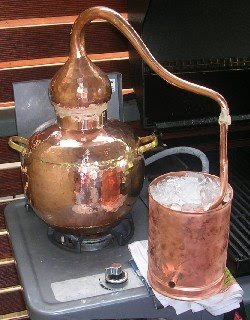
If you’ve just purchased raw materials, equipments or any stills for sale, try not to be too excited that you make yourself forget the basics in distilling alcohol. If you’re a novice, the following are common questions you need to ask before embarking on the craft of distilling.
What does distillation mean?
Ethanol distillation involves the boiling as well as re-condensing of ethanol, water and trace liquids such as congeners, higher alcohols, fusel oils. The objective of distillation is to decrease the amount of water while increasing ethanol and removing most, if not all, of the trace liquids. This process is made possible due to ethanol and water’s contrasting boiling points.
Take note that ethanol’s boiling point is lower than that of water. Therefore, the vapor that boils off from a mixture of ethanol and water will carry more concentration of ethanol compared to the liquid where the vapor originated from. Essentially, the distillation process is the science of perfecting and controlling these effects.
How is ethanol made?
Ethanol is the organic byproduct of yeast that has processed and consumed glucose in a state where there is no presence of oxygen. Yeast is a live organism. It could only produce enough ethanol before it poisons its own self and dies.
Different strains of yeast carry various ethanol tolerances thus there are yeast strains that could produce the most percentage of ethanol.
Is alcohol distilling safe?
If you want to know if you will get blown up or if you will go blind from distilling and drinking your own alcohol, know that these are few of the actual risks involved in home distilling.
Distilling alcohol is not entirely safe but there are techniques you can do to get yourself out of harm’s way. Technically, you can avoid poisoning yourself or having a still explode in your home.
Firstly, do not leave a still unattended. When working, stills must always be monitored to ensure that they are properly functioning, e.g. not leaking, etc.
Secondly, do not distill indoors. Always distill alcohol outdoors as sealed/closed stills have the possibility to build-up pressure and explode.
Thirdly, alcohol vapor is extremely flammable and concentrated that it is explosive. Always check if your still is knocking all the vapors down when running. These vapors must not leak into your work area. To be further safe, have a fire extinguisher available and within easy reach.
Fourthly, label all the distillate you collected. Foreshots (the initial result when distilling) are poisonous and must be noted as so when collected in a container to avoid it being ingested. Almost 90%-95% of produced ethanol that comes from a reflux column is lethal and should not be drunk without decreasing the ethanol’s strength. Always label containers and bottles legibly and clearly so you and others will not be harmed.
How do you keep yourself safe?
If you plan to distill alcohol as a hobby, know that you need to put in a lot of time. You also have to use safe materials and observe proper techniques when distilling. A still that is correctly constructed and properly removing unwanted congeners will highly likely produce a concoction that is as good, if not better than, spirits that are commercially produced.
About the Author:
Jason Stone is the owner of Whiskey Still, a company which manufactures different still products such as whiskey still and moonshine still. The company is located at Houston, Texas. They provide quality and effective products for Scotch, Rum, Bourbon, Cognac, Schnapps, Tequila and Vodka production.

Nice post....
ReplyDeleteWhiskey still